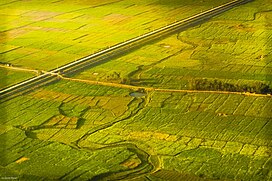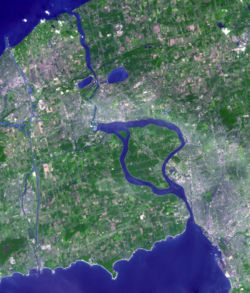드워킨의 게임 드라이버
Dworkin's Game DriverDGD(Dworkin's Game Driver)는 펠릭스 A. 드워킨 크로즈(Felix A. "Dworkin" Croes)가 작성한 LPMud 서버입니다.[1][2] DGD는 특히 디스크 기반 객체 스토리지, 전체 세계 지속성, 드라이버와 머들립 간의 우려 분리, 런타임 모피즘, 자동 가비지 수집, 경량 객체 및 LPC-to-C 컴파일과 같은 MUD의 중요한 기술 혁신을 개척했습니다.[1][3][4]
역사
DGD의 첫 번째 공개는 1993년 8월 12일이었습니다.[3]
DGD를 사용한 최초의 MUD는 1993년 12월 PaderMUD(이후 Xylomer)입니다.[5]
DGD를 위한 최초의 주요 개발 MUD는 The Pattern([6]Dworkin Barimen을 지칭하는 Croes의 필명 Dworkin과 같은)을 참조하는 The Pattern(패턴)이었습니다. 1997년 2월 이전에 오프라인으로 전환되었습니다.[7]
1994-1995학년도 동안 DGD는 Katholieke Universityititite Leuven에서 석사 학위 논문의 핵심 요소였습니다. 논문 작업의 일환으로 객체 간에 전달되는 배열 및 매핑을 처리하기 위한 결정론적 메커니즘이 고안되었습니다.[8]
1995년 12월, DGD의 상업적 사용에 대한 독점적인 권리는 1996년 1월 아이챗에 독점적인 라이선스를 판매한 비하이브 인터넷 테크놀로지스에 의해 인수되었습니다. 아이챗은 최초의 야후! 채팅방을 설립하기 위해 DGD를 사용했습니다. ichat는 1999년 2월 스코토스에 서브 라이선스를 판매한 Acuity Corporation이 되었습니다. 스코토스는 DGD를 사용하여 일련의 온라인 게임을 만들었습니다. 애큐리티 코퍼레이션은 나중에 퀸터스 코퍼레이션에 인수되었습니다. 2001년 3월, 그 회사의 파산으로 독점 라이선스가 해지되었습니다.[4][9]
2002년, DGD는 영구적인 분산 객체 시스템에 대한 학술 연구에 사용되었습니다.[10]
2005년 8월, DGD의 상업적 사용 권한은 다시 Croes의 회사인 Dworkin B.V.로 할당되었습니다.[4]
2010년 2월 3일, DGD 1.4는 오픈 소스 소프트웨어로 출시되었습니다.[11]
참고 항목
참고문헌
- ^ a b Shah, Rawn; Romine, James (1995). Playing MUDs on the Internet. John Wiley & Sons, Inc. pp. 164–165. ISBN 0-471-11633-5.
DGD, created by Dworkin a.k.a. Felix Croes, is a complete rewrite of the LPmud game. It differs from the original in that it is mostly a disk-based game. This means that the objects on the Mud are mostly stored on disk rather than kept in memory during play of the game. This method creates a Mud that does not use much memory, is somewhat fast, but requires a large amount of disk space. This is also one of the few Muds that can be used commercially, given the permission of its creator.
- ^ Busey, Andrew (1995). Secrets of the MUD Wizards. SAMS Publishing. p. 216. ISBN 0-672-30723-5.
Another type of server, called DGD (Dworkin's Game Driver), on the surface looks to be similar to LPMUD and even incorporates the LPC language, but is not derived from the LPMUD server. DGD is a new server that is designed to be LPMUD-compatible but adds a new level of programming flexibility—in fact, MirrorMOO, running on a DGD server, emulates the MOO server.
- ^ a b Reese, George (1996-03-11). "LPMud Timeline". Archived from the original on February 26, 2012. Retrieved 2010-04-14.
August 12, 1993 ¶ A single-user alpha release of the first LPC server not derived from LPMud, DGD 1.0.a3 (Dworkin's Game Driver, later renamed Dworkin's Generic Driver, and later reverted to Dworkin's Game Driver), is released for testing. DGD isolated essential LPC functionality, leaving all, if any, game functionality completely up to the mudlib. [...] September 16, 1993 ¶ DGD is released in multi-player form as DGD 1.0.a4. This version introduces support for compiling LPC code to C, then linking C objects in with the driver. This makes DGD the first driver to support such functionality.
- ^ a b c Croes, Felix (2010-04-02). "Dworkin's Game Driver - Open Source Release". SourceForge. Retrieved 2010-04-18.
- ^ Reese, George (1996-03-11). "LPMud Timeline". Archived from the original on 2012-02-26. Retrieved 2010-04-14.
December 1993 ¶ PaderMUD re-opens after having converted from CD to DGD, making PaderMUD the first production MUD using DGD.
- ^ Busey, Andrew (1995). Secrets of the MUD Wizards. SAMS Publishing. p. 456. ISBN 0-672-30723-5.
Pattern, The [...] This is the home MUD for Dworkin's Game Driver (DGD). It is the best place to go to ask DGD-related questions or to learn more about DGD.
- ^ Johnston, Craig (1997-01-31). "DGD, archives from the pattern". rec.games.mud.lp. Retrieved 2010-04-27.
- ^ Van Hees, Kris (1995-07-01). Experimental programming in an object oriented system (PDF) (Lic. Informatics thesis). Katholieke Universiteit Leuven. Retrieved 2010-11-05.
This thesis describes modifications made to Dworkin's Game Driver (DGD) to provide non-clonable objects (entities) and deterministic pointer type conversion from reference to copy at execution thread boundaries.
- ^ "Skotos Tech Acquires DGD License" (Press release). Skotos. 1999-02-05. Retrieved 2010-04-18.
- ^ Hansen, Geir Harald (2002-07-31). A Distributed Persistent World Server using Dworkin's Game Driver (PDF) (Cand. Scient. thesis). University of Oslo. Retrieved 2010-04-14.
This thesis describes the design and implementation of a persistent distributed object oriented system and programming environment. It is built on an existing non-distributed server, Dworkin's Game Driver (DGD).
- ^ Croes, Felix (2010-02-23). "DGD Home Page". Retrieved 2010-04-14.
DGD version 1.4 was released as Open Source on 3 February 2010.


